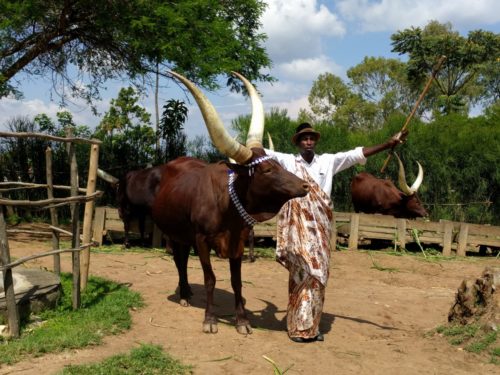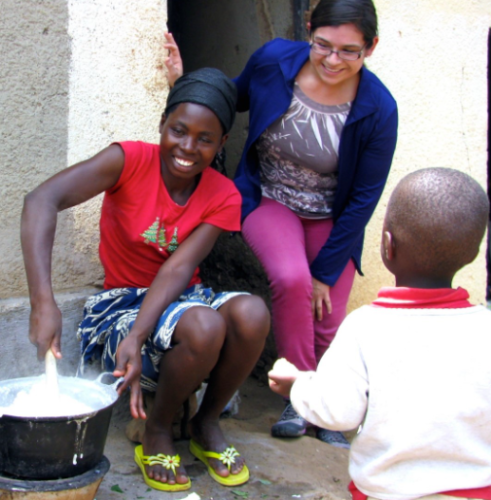In Rwanda, cows are culturally revered and given as gifts, which create a lasting bond of goodwill and camaraderie between the giver and receiver. Because cows hold such esteem in Rwanda, the Gir’inka program, which provides a poor family a cow, has been successful in alleviating malnutrition and poverty. Recipients of a cow from the Gir’inka program, give their first-born female cow to another poor family in the community. This program has helped Rwandans overcome the past genocide by creating bonds within their community. While this program has had great success, Rwandans, like most nations, still face enormous challenges in improving health and food security.

I found myself in Rwanda for the first time in 2014 as a Ph.D. student leading a clinical milk microbiology laboratory workshop. As a member of the UC Davis Dairy Food Safety Laboratory, we worked in collaboration with a USAID program to improve the dairy sector through the delivery of our program, Dairy Dynamic Management (DDM), which is a protocol based management system that implements changes needed to sustain production of high quality milk for a profit. The foundation of DDM is our “One Health Approach,” the concept that the health of humans, animals and the ecosystem are inextricably linked. A One Health Approach recognizes that dairy production is actually quite complex and encompasses everything from the soil in which plants grow to the food product on your table at home. Our mission in Rwanda was to deliver this philosophy and problem solving approach while building capacity to increase food production, improve food safety and human health while alleviating malnutrition and food insecurity. We began by building a team of scientists, educators and farm advisors to ensure that humans, animals and the ecosystem remain healthy and in balance while producing food and products that people need.
Globally, the number one cause of economic loss to dairy producers is mastitis, which is an infection of the udder, resulting in decreased milk quality and production. Mastitis is also a cause of foodborne and zoonotic disease for those that consume unpasteurized or undercooked dairy products, which often occurs in poor households in Rwanda. Additionally, when lactating cows are treated for mastitis with antibiotics, often times label use is not followed which can result in antimicrobial resistance, environmental contamination and consumption of milk with antibiotic residues. The scientific community now knows that the consumption of foods with antibiotic residues can negatively impact beneficial microbes in our guts and is of special concern in children and infants, as dysbiosis is correlated with negative health outcomes. Clinical and subclinical mastitis affects over 70% of cattle in Rwanda and we identified mastitis prevention and control as a single issue in the dairy sector that can improve animal health, human health, food safety and the economic wellbeing of smallholder farmers.

Over the last five years, our work has allowed us to build customized educational materials and training programs for students and faculty at University of Rwanda as well as public and private veterinarians. We engaged stakeholders from private industry, regulatory agencies and farmer associations to participate in research, education and outreach. Our work resulted in and supported many activities including the convening of Rwanda’s first National Mastitis Workshop in 2015, the Rwanda Mastitis Prevention and Control Implementation Plan for 2015-2020 and ultimately resulted in the opportunity for me to return to Rwanda as a Fulbright Postdoctoral Scholar for the 2017-2018 academic year.
The insights I have gained while working in a developing country are invaluable and apply to my work at home as well. Often times, those of us from regions of the world with instant access to knowledge and resources take for granted what is really needed to implement change, and it does not require a high tech or complicated approach. What most farmers around the world need is basic education in plant or animal health, hygiene and biosecurity to prevent transmission of foodborne and zoonotic disease to themselves, their children, and their surroundings. By implementing a low-tech approach we are in reach of improving animal health, human health, food safety and economic wellbeing of smallholder farmers, but this does not come without significant investment of time and financial resources. We must continue to build capacity with our partners abroad to provide these resources to smallholder farmers. Through teamwork, exchange of knowledge, mutual understanding and developing friendships, we can make a lasting impact in food safety and security in developing regions.
About the Author
Sara N. Garcia, Ph.D. is an Assistant Project Scientist at the Western Institute for Food Safety and Security, University of California Davis.


